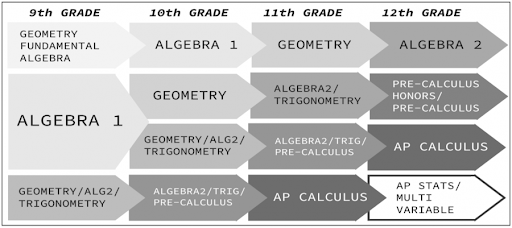The Benefits of Rigor

With the increasing difficulty of Irvington’s math pathway in recent years, an outcry for change has erupted from concerned parents and students across the district. Within the Irvington math system, students choose between normal, single, and double accelerated pathways, and then stay in these pathways for the four years they’re at Irvington High. In recent occasions, students have demanded the ability to switch out of these more advanced pathways at will, depending solely on their choices. The Irvington math pathway should not be changed, because transferring students will not be prepared for higher levels of mathematics, and the pathway has been successful throughout Irvington’s history. Irvington’s double accelerated track should not be eliminated, nor should students from easier tracks be able to transfer in, to ensure equity remains throughout all math programs at Irvington. Additionally, current students of the double accelerated math pathway have found it to be extremely helpful to their educational progression.
With the difficulty of Irvington’s math pathway being unparalleled throughout the school comes an inability to simply transfer pathways. Irvington’s math program’s reluctance at this shifting, however, is justified, because it’s simply not plausible to be able to keep up with harder coursework without prior experience. Additionally, the math pathway’s difficulty caters towards all students, with the three forms specializing with all students’ needs. The normal pathway offers math experience to students who want to perform beginner-intermediate level mathematics, and the single accelerated experience also caters to intermediate-advanced level math. Finally, the pathways ensure equity in all the classes, to make sure students aren’t struggling in classes too difficult for them. If students are in classes too easy for them, it’s their choice on whether they want to take a challenging course or a simple course- and the math pathways system provides this choice.
However, apart from the question of equity, the difficulty of the math pathway provides uniquely catered benefits to those in the class. The pathway ensures students are adequately challenged to meet their standards. As Sparsh Bansal (11), an AP Calculus AB student in the double accelerated pathway states, “The math pathway has been very helpful for me at Irvington, and some of my favorite teachers and educational experiences have come from it.”
This sentiment is echoed by many in the double accelerated pathway, and while critics say the differences in difficulty between pathways are too drastic, students struggling in classes are always welcome to seek help from other students, counselors, or teachers to ensure their needs are being met. The pathways, in totality, offer the opportunity to take classes you know will challenge you, and that, in essence, is the whole point of the school system in general.
The double accelerated pathway provides benefits, including its difficulty, but also the resources it offers; help is always available to those who need it. But the math pathways are needed, to ensure that students who require more rigorous classes are able to take them and are not placed in classes unfit for them.






